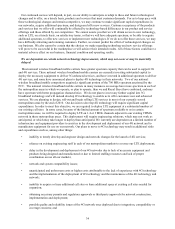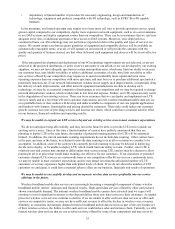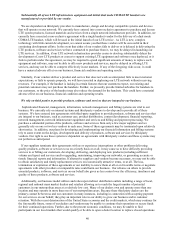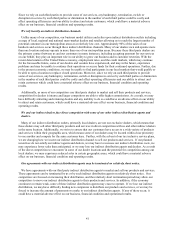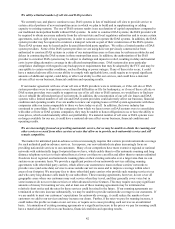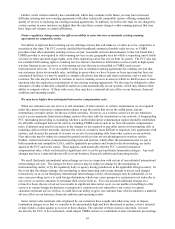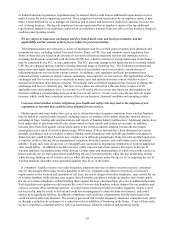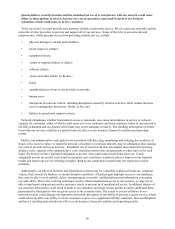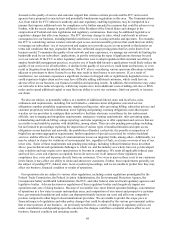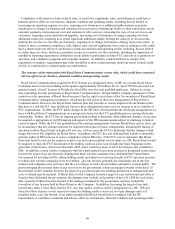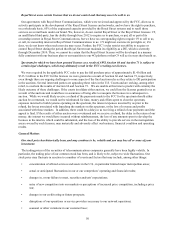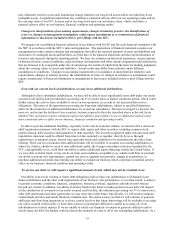Metro PCS 2009 Annual Report Download - page 56
Download and view the complete annual report
Please find page 56 of the 2009 Metro PCS annual report below. You can navigate through the pages in the report by either clicking on the pages listed below, or by using the keyword search tool below to find specific information within the annual report.44
in which wireless termination rates are set without guidance from the FCC, and may be interpreted to leave open the
prospect of CMRS carriers being liable for certain terminating compensation charges even in the absence of
negotiated agreements. A determination that we are liable for additional terminating compensation payments could
subject us to additional claims by other carriers. Further, legal and business considerations may inhibit our ability or
willingness to block traffic to telecommunication carriers who demand unreasonable payments. In addition, certain
transit carriers have taken the position that they can charge “market” rates for transit services, which rates may in
some instances be significantly higher than our current rates or the rates we are willing to pay. We may be obligated
to pay these higher rates and/or purchase services from others, engage in direct connection, or pay terminating
compensation charges in the absence of negotiated agreements, which may result in higher costs, which could have a
material adverse effect on our business, financial condition, and operating results.
A portion of our third-party customer service and technical support providers and a portion of our revenue are
derived from geographic areas susceptible to natural and other disasters.
Our focus on major metropolitan areas and our use of third party suppliers and service providers, some of which
are located in developing nations, such as Mexico, Panama, Antigua and the Philippines, may make our products
and services more susceptible to certain events, including political upheavals, war, terrorist attacks, strikes, natural
disasters, and pandemics, which could adversely affect our business, financial condition and operating results. The
outsourcing of certain customer and technical support lowers our operating costs and adds flexibility, but also adds
risk as we rely on these third-party service providers working directly on our behalf with our customers. Customers
may react negatively to or have certain perceptions about our use of or their receiving direct customer and technical
support from outside the U.S., especially with the current legislative scrutiny and focus on jobs being sent overseas
and the security of personal information being sent overseas. In addition, our markets in California, Texas and
Florida represent a substantial portion of our business. These same states, among others, have a history of natural
disasters that may adversely affect our operations in those states such as hurricanes, tornadoes or flooding. These
events also may cause our networks to cease operating for a substantial period of time while we reconstruct or repair
them and our competitors may be less affected than we are. Some network outages give rise to regulatory reporting
obligations, which subject us to additional burdens and risks, and if we fail to meet such obligations, it could result
in fines, forfeitures, consent decrees, corporate monitors or other adverse actions. We cannot provide any assurance
that the business interruption insurance we have will cover all losses we may experience as a result of such events,
that the insurance carrier will be solvent, that rates will remain commercially reasonable that the insurance carrier
will not drop us, or that the insurance carrier will pay all claims made by us. If we experience any of these events,
we may lose revenue, customers, and experience increased expenses, we may have difficulty attracting new
customers in the future, and may have difficulty finding new suppliers and vendors, which could have a material
adverse effect on our business, financial condition and operating results.
Our success depends on our ability to attract and retain qualified management and other personnel.
Our business is managed by a small number of key executive officers, including our chief executive officer, Roger
Linquist. None of our managing key executives has an employment contract, so any such executive officers may
leave at any time subject to forfeiture of any unpaid performance awards and any unvested options or restricted
stock. However, at this time, the exercise price of a substantial portion of the unvested options of our key executive
officers is above, and in some cases significantly above, the current trading prices of our common stock. We believe
that our future success depends in substantial part on our continued ability to attract and retain highly
knowledgeable, qualified executive, technical and management personnel. We believe that competition for highly
qualified management, technical and sales personnel is intense, and there can be no assurance that we will retain our
key management, technical and sales employees, that we will be successful in attracting, assimilating or retaining
other highly qualified management, technical and sales personnel in the future sufficient to support our continued
growth, or that we will be successful in replacing any of our key management, technical and sales personnel that
may retire or cease to be employed by us. We have experienced occasional difficulties in recruiting qualified
personnel and there can be no assurance that we will not experience such difficulties in the future. The departure or
retirement of, or our inability to attract or retain, highly qualified executive, technical and management personnel,
including the chief executive officer, could have a material adverse effect on our business, financial condition and
operating results. We do not maintain any “key person” life insurance for any of our executive officers.
Recent political changes could have an adverse effect on our relationship with our workforce.
None of our employees is covered by a collective bargaining agreement or represented by an employee union.
With the recent changes in the party affiliation of the President of the United States and the changes in composition


